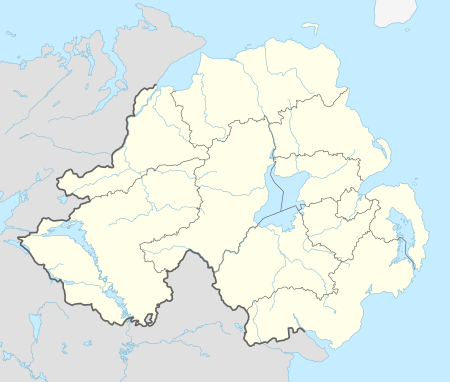Shaw's Road
Shaw's Road is a road in west Belfast, Northern Ireland, connecting the Andersonstown Road with the Glen Road.
Shaw's Road
| |
|---|---|
 Shaw's Road Location within Northern Ireland | |
| Population | 200 (approx) |
| • Belfast | 3 mi (4.8 km) |
| County | |
| Country | Northern Ireland |
| Sovereign state | United Kingdom |
| Postcode district | BT11, BT12 |
| Dialling code | 028 |
| Police | Northern Ireland |
| Fire | Northern Ireland |
| Ambulance | Northern Ireland |
| UK Parliament | |
| NI Assembly | |
Shaw's Road Gaeltacht
Located on the road, is a small Gaeltacht (Irish-speaking area) known colloquially as "The Irish Houses", and in Irish as Bóthar Seoighe (meaning "Shaw's Road") and Pobal Feirste (meaning "Farset Community").[1] This community was established in 1969 when five families from Belfast built their houses together in a new development on the road. One of the early residents was Aodán Mac Póilin. The community expanded through the years and now there are 22 houses in the Gaeltacht.
In 1971, parents in the Gaeltacht established the first Irish-medium school in Northern Ireland. After much turbulence during that time, and a lengthy campaign, the school received official recognition from the Department of Education in 1985.[2] The school has since grown rapidly and is no longer under direct administration by the Gaeltacht, but remains Irish-medium and over 350 students attend.
The Shaw's Road Gaeltacht has a strong culture of traditional music, dance and drama and the Irish language continues to be the normal language of communication between residents.[3]
The Shaws Road Gaeltacht is considered the inspiration for Irish speakers throughout Ulster. This is the argument of a BBC Gaeilge two-part documentary “The Irish Houses – Scéal Phobal Bhóthar Seoighe” (the story of the Shaw’s Road community).[4][5]
There is often some confusion between the Shaw's Road Gaeltacht and the Gaeltacht Quarter in west Belfast,[6] which is a related, but newer and distinct project located in the centre of the Falls Road district. The Shaw's Road Gaeltacht is located closer to Andersonstown.
References
- Mac Póilin, Aodán (2007) "Nua-Ghaeltacht Phobal Feirste: Ceachtanna le foghlaim?" In: Wilson McLeod (Ed.) Gàidhealtachdan Ùra; Leasachadh na Gàidhlig agus na Gaeilge sa Bhaile Mhòr. Edinburgh: Edinburgh University, p. 31.
- Maguire, Gabrielle (1991) Our Own Language, An Irish Initiative. Clevedon: Multilingual Matters.
- Nig Uidhir, Gabrielle (2006) "The Shaw’s Road urban Gaeltacht: role and impact." In: Fionntán de Brún (ed.), Belfast and the Irish Language. Dublin: Four Courts Press, pp. 136-146.
- "The Irish House". BBC i-Player. Retrieved 16 May 2020.
- "Belfast Gaeltacht inspired Irish speakers all over North". The Irish News. 16 May 2020. Retrieved 16 May 2020.
- Mac Póilin, Aodán (2007) "Nua-Ghaeltacht Phobal Feirste: Ceachtanna le foghlaim?" In: Wilson McLeod (Ed.) Gàidhealtachdan Ùra; Leasachadh na Gàidhlig agus na Gaeilge sa Bhaile Mhòr. Edinburgh: Edinburgh University, pp. 57-59.
External links
- Bunscoil Phobail Feirste Comhairle na Gaelscolaíochta
- Naíscoil Bhreandáin Comhairle na Gaelscolaíochta